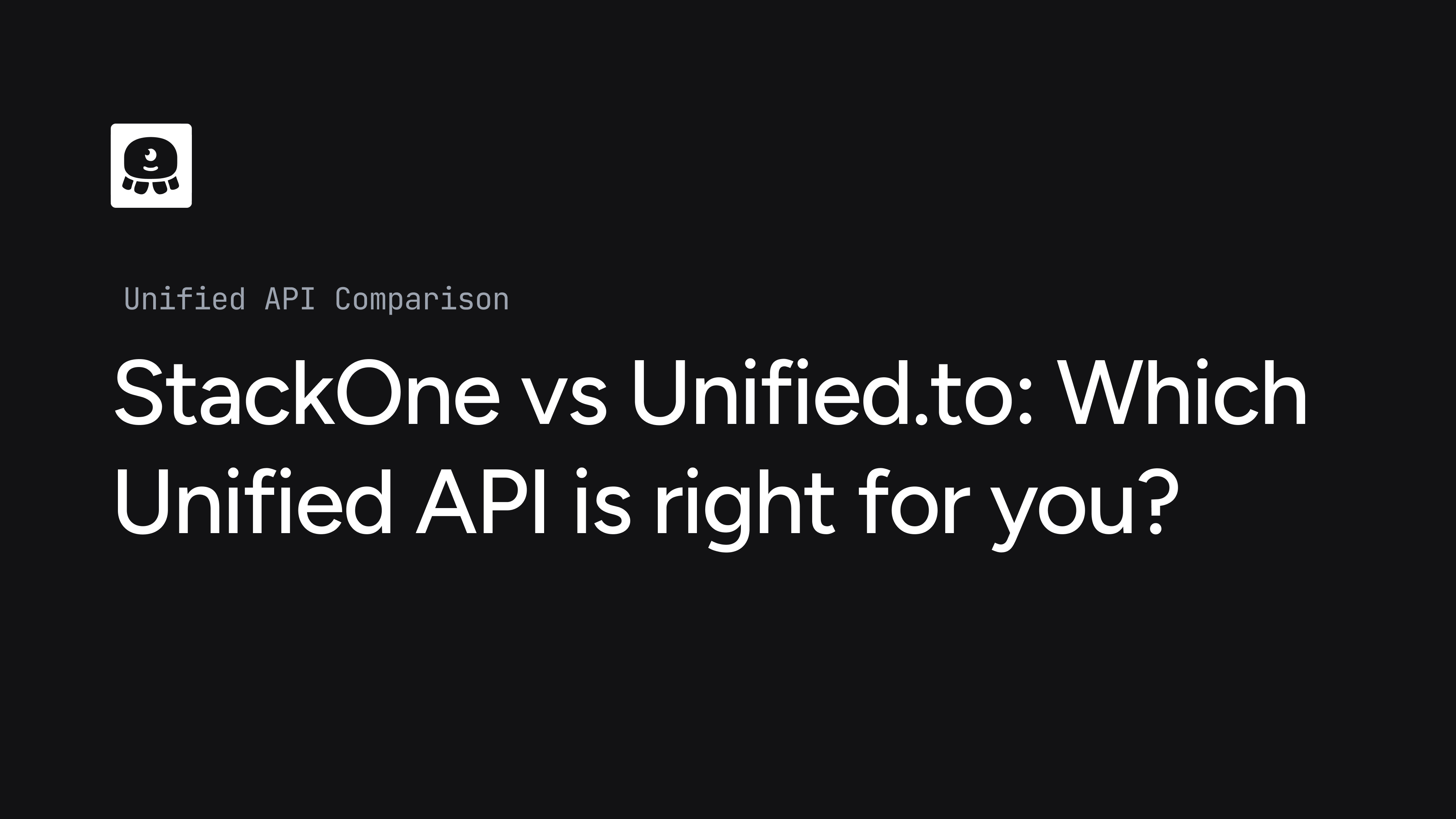StackOne vs. Unified.to: which Unified API platform powers real-time, AI-driven SaaS best?
June 1, 2025

StackOne helps SaaS teams ship AI-native features using real-time APIs and pre-built AI actions. But if you care about token efficiency, normalized schemas, and total data control, there are tradeoffs.
Unified.to offers a unified API built for real-time, AI-ready applications—without storing end-customer data. You get clean, normalized data from 270+ sources, delivered directly into your database or via webhooks, with zero vendor lock-in.
At a glance: Unified.to vs StackOne
StackOne is built for AI agents with a broad integration surface and 3,000+ prebuilt AI actions. Unified.to focuses on delivering real-time, structured data pipelines to help engineers and product teams build faster.
Unified.to offers:
- Clean, normalized schemas across 270+ APIs
- Real-time delivery with native and virtual webhooks
- Database Sync: stream structured data directly to Postgres, Mongo, and more
- Zero storage architecture (no logs, no payload caching)
- Transparent usage-based pricing
Real-time delivery without storage or sync jobs
StackOne supports real-time updates using native and synthetic webhooks, backed by polling where needed. Synthetic events run hourly by default and avoid PII caching, which helps with compliance.
Unified.to delivers real-time updates with zero polling logic. Webhooks—native where possible, virtual otherwise—push fresh data in a normalized schema directly to your backend. No sync jobs. No queue logic. Just current, structured data delivered instantly.
Schema normalization without custom mapping
StackOne standardizes over 16,000 fields across more than 200 apps. Its pre-normalized schemas reduce token load and improve LLM performance. For example, fetching a Workday record consumes 25x fewer tokens than using the native SOAP API.
Unified.to provides deeply normalized schemas for over 1,100 objects across 270+ integrations. You get structured outputs with standard fields and enums. Custom fields and passthrough data are available, but you don't need to build per-connector logic to get started.
Data pipelines that fit AI-native products
StackOne offers structured payloads for AI agents, RAG, and vector search workflows. It includes prebuilt actions and optimized schemas to help reduce model context usage. Tool-calling integrations work with OpenAI, LangChain, CrewAI, and more.
Unified.to supports AI-native use cases through real-time streaming into databases. With Database Sync, you can ingest structured records from CRMs, ATSs, HR platforms, and more—directly into your internal data systems. No ETL. No vendor lock-in.
Zero data stored. Zero vendor lock-in.
StackOne offers a "no-storage-by-default" architecture. For synthetic events, it avoids storing PII and supports flexible hosting (e.g., self-hosted, region-based deployments). Tokens and logs may still be stored depending on config.
Unified.to never stores end-user data, logs, or tokens—by design. You control secrets, observability, and data flow. Credentials can be managed via your own vault, and delivery methods include API, webhook, or direct DB sync.
Built for developers, not just agents
StackOne provides AI SDKs (Python, Node.js) and developer SDKs (Java, PHP, Ruby, TypeScript) along with a Postman collection and OpenAPI spec. Its AI SDKs support tool-calling, parameter mapping, and multi-tenant routing.
Unified.to offers SDKs across major languages, a clean declarative API, and an embedded Connect Component. Developers integrate once and scale fast. No need to maintain schema maps or webhook handlers for each platform. Data is real-time by default.
TL;DR — Unified.to vs StackOne
| Feature | Unified.to | StackOne |
|---|---|---|
| Data model | Deeply normalized schemas across 270+ integrations | 16,000+ normalized fields across 200+ integrations |
| Real-time support | Native + virtual webhooks, no polling | Native + synthetic webhooks, 1-hour polling for synthetic |
| AI readiness | Real-time DB sync, structured records for RAG & agents | 3,000+ prebuilt AI actions, optimized tool-calling SDKs |
| Data storage | Zero data stored (no tokens, logs, or payloads) | No PII stored in synthetic polling; some logs/tokens retained |
| Developer experience | SDKs, declarative API, Connect Component | SDKs, AI SDKs, OpenAPI, Postman, Tool Planner |
| Integration coverage | 270+ integrations, 1,100+ objects | 200+ integrations, 3,000+ AI actions |
| Delivery model | Real-time webhooks + DB sync (no batch jobs) | Real-time + batch sync, API + webhook access |
| Security & compliance | Zero data storage, BYO secrets/logs, SOC 2, GDPR | SOC 2, HIPAA, GDPR; no-storage-by-default model |
| Pricing | Starts at $350/mo, free trial available | Starts at $499/mo, no public free tier |
| Best for | AI-native SaaS with structured data pipelines | AI agents needing broad tool access + tool planning engine |
Unified.to gives you structured data pipelines—real-time, AI-ready, and under your control.
Start your free 30-day trial or book a demo to see how fast you can go from integration request to production.
